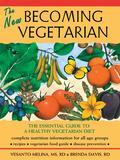More and more people are looking towards becoming vegetarians for health reasons and in order to leave a smaller carbon footprint when it comes to diet. This book provides practical tools to help them make food choices that promote optimal health. Comprehensive and well-researched, here is essential information needed to make the transition to a vegetarian diet and, if already a vegetarian, to help maximize its benefits. A crash course in nutrition in lay- person's terms explains the role of protein, calcium, iron, good fats, vitamins, protective phytochemicals, and more and how to get these nutrients in a well-balanced vegetarian diet. Graphic support in the form of tables, figures, menus, and food guides help readers determine what food choices work best for their special nutritional requirements. There is also a section that focuses on diseases linked to over-consumption of animal foods, and what plant-based dietary components and factors play active roles in the prevention and treatment of heart disease, cancer, diabetes, and other chronic illnesses. Included are recommendations for all stages of life from infancy to senior citizens, along with advice on diplomacy and dealing with social situations, Thanksgiving dinners, etc, in which vegetarians are often pressured to eat meat. For practical application, 50 healthy, simple, and foolproof recipes destined to become family favorites help make trying a new style of eating an easy satisfying experience.
-
- Categories
- Other
- Asian Food
- Thai Food
- Italian Food
- Pizza
- BBQ & Grill
- Indian Food
- Chinese Food
- Seafood
- Kebab
- Dessert
- Burgers
- Halal Food
- Drinks
- Salad
- Pasta
- Soup
- Lamb
- Beef
- Spanish Food
- Greek Food
- Pork
- Mexican Food
- Pastry
- Cocktails, Punch & Alcoholic Drinks
- French Food
- Portuguese Food
- British Food
- Moroccan Food
- Chicken
- Chef Recommendation
- Restaurant
- Cafe
- Where to Eat?
- For Home
- Fashion
- Decoration
- Food Products
- Business Services
- New
- Popular
- Gifts
- Videos
- Help / Contact Us
- Terms & Privacy
- What is FoodTerest


